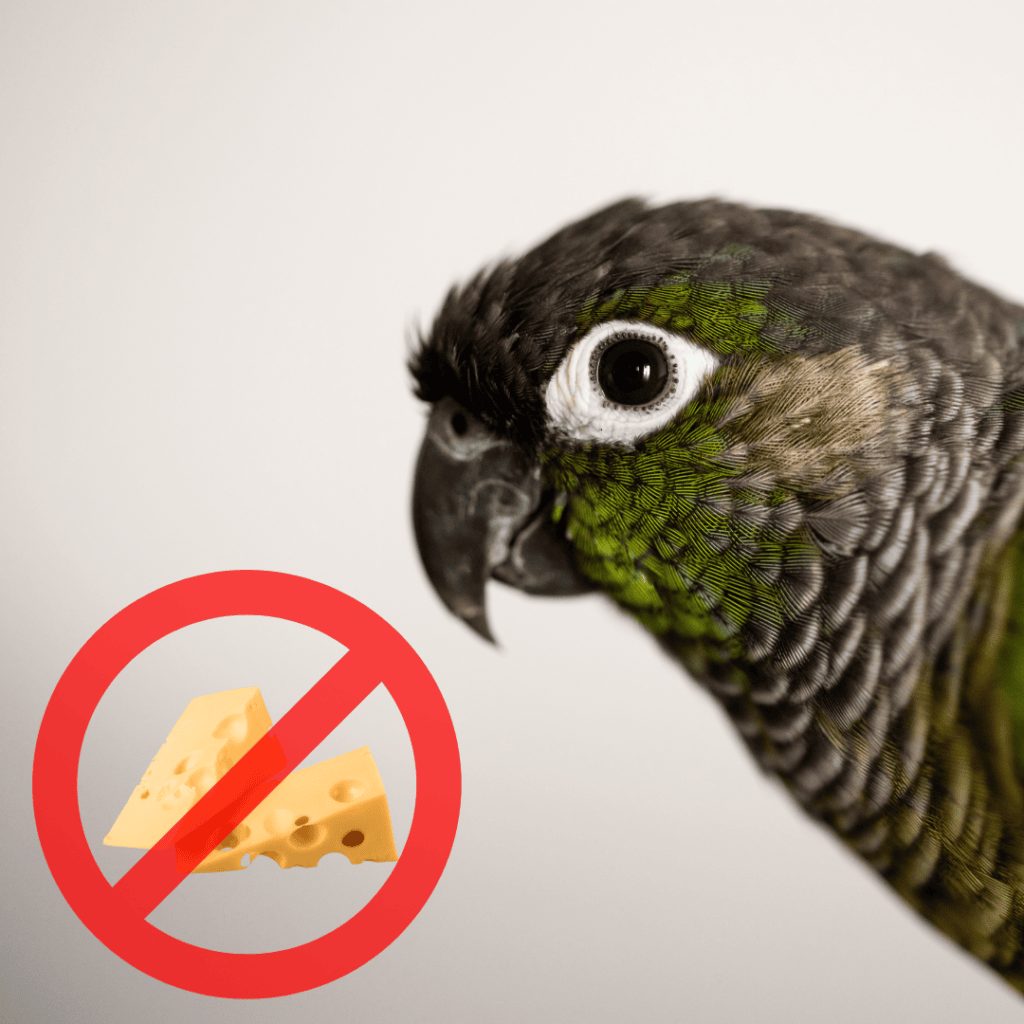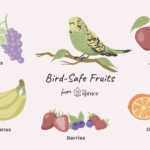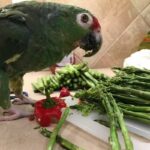Parrots should not eat cheese. Dairy products can cause digestive issues in parrots.
Parrots have unique dietary needs that differ from humans. Their digestive systems are not designed to handle dairy products, including cheese. Feeding cheese to parrots can lead to gastrointestinal problems and other health issues. Parrots thrive on a balanced diet of fruits, vegetables, seeds, and nuts.
Introducing inappropriate foods can disrupt their digestive system and overall well-being. Always research or consult with an avian vet before adding new foods to your parrot’s diet. Prioritizing their specific nutritional needs ensures a healthy and happy life for your feathered friend.

Credit: pangovet.com
Introduction To Parrots’ Diet
Parrots are colorful, intelligent birds. They require a balanced diet to stay healthy. Their diet needs to include various foods to meet their nutritional needs.
Common Foods For Parrots
Parrots eat a variety of foods. Here is a list of common foods:
- Fruits: Apples, bananas, grapes
- Vegetables: Carrots, broccoli, spinach
- Seeds: Sunflower seeds, flax seeds
- Nuts: Almonds, walnuts, pecans
- Grains: Brown rice, oats, quinoa
Nutritional Needs
Parrots need specific nutrients to thrive. Here is a table of their nutritional needs:
| Nutrient | Importance |
|---|---|
| Protein | Builds and repairs tissues |
| Vitamins | Supports immune system |
| Minerals | Strengthens bones and beaks |
| Fats | Provides energy |
| Fiber | Aids digestion |
Cheese Composition
Parrots are curious eaters. Owners often wonder if cheese is safe. Understanding the composition of cheese helps answer this. Cheese has various ingredients and nutrients. Let’s explore these details.
Ingredients In Cheese
Cheese is made from milk. Common ingredients in cheese include:
- Milk (cow, goat, or sheep)
- Salt
- Bacterial cultures
- Rennet
Some cheeses have added flavors. These can be herbs, spices, or fruits. These ingredients can affect the safety for parrots.
Nutritional Profile
Cheese contains several key nutrients:
| Nutrient | Amount (per 100g) |
|---|---|
| Protein | 20g |
| Fat | 33g |
| Calcium | 721mg |
| Sodium | 621mg |
Cheese is high in protein and calcium. It also has a lot of fat and sodium. These nutrients can affect a parrot’s health.
Dairy And Birds
Many bird owners wonder if their feathered friends can eat dairy. Parrots are curious eaters and often try new foods. But is cheese safe for them? Let’s explore if dairy products are suitable for birds, especially parrots.
Birds And Lactose
Birds, including parrots, are generally lactose intolerant. They lack the enzyme lactase needed to digest lactose. This can cause digestive issues, such as diarrhea and upset stomachs.
Lactose intolerance in birds means they should avoid dairy. Even small amounts can be harmful. Always be cautious about what you feed your parrot.
Common Dairy Products
| Dairy Product | Safe for Parrots? |
|---|---|
| Milk | No |
| Cheese | No |
| Yogurt | No |
| Butter | No |
Most dairy products are unsuitable for parrots. Cheese, despite its popularity, is not safe. Milk, yogurt, and butter should also be avoided.
- Milk contains lactose, which parrots cannot digest.
- Cheese is rich in fat and lactose, harmful to birds.
- Yogurt, though less lactose, still poses a risk.
- Butter is high in fat and can cause health issues.
Feeding your parrot a balanced diet is crucial. Stick to bird-safe fruits, vegetables, and seeds. Avoid dairy to keep your feathered friend healthy and happy.
Potential Risks Of Cheese
Parrots love to nibble on human food, but not all foods are safe. Cheese is one such food that poses several risks to parrots. Let’s look at the two main concerns: lactose intolerance and high fat content.
Lactose Intolerance
Parrots cannot digest lactose. They lack the enzyme needed to break it down. This can cause digestive problems.
| Symptoms | Details |
|---|---|
| Diarrhea | Loose and watery stools. |
| Bloating | Swollen abdomen. |
| Discomfort | Pain or unease in the stomach. |
High Fat Content
Cheese contains a lot of fat. This can lead to obesity in parrots.
- Obesity can cause health issues.
- Fatty liver disease is a risk.
- High fat can shorten a parrot’s lifespan.
Offering cheese to parrots is not recommended. Stick to bird-safe foods to keep your parrot healthy.
Benefits Of Cheese
Parrots have a varied diet. Cheese can be a part of it. This section discusses the benefits of cheese for parrots. Let’s explore the nutritional benefits and why cheese can be an occasional treat.
Nutritional Benefits
Cheese contains several nutrients. These nutrients can benefit your parrot. Here is a breakdown of the nutritional benefits:
| Nutrient | Benefit |
|---|---|
| Calcium | Helps in strengthening bones |
| Protein | Supports muscle growth |
| Vitamin A | Improves vision and skin health |
Cheese also has essential fats. These fats provide energy. Remember, moderation is key.
Occasional Treat
Cheese should not be a daily food. It is best as an occasional treat. Here are some reasons why:
- High in Fat: Too much fat can lead to obesity.
- Lactose Content: Parrots are lactose intolerant. Too much cheese can upset their stomach.
- Balance Diet: Parrots need a varied diet. Cheese should not replace other foods.
Offer small amounts of cheese. Observe how your parrot reacts. If there are no issues, cheese can be a delightful treat.

Credit: birdsittingtoronto.ca
Safe Alternatives
Parrots are curious eaters and often want what we eat. But not all human foods are safe for them. Cheese, for example, can be harmful. Instead, offer safe alternatives to keep your parrot healthy and happy.
Healthy Snacks
Parrots love snacks that are healthy and nutritious. Try giving them these:
- Fruits: Apples, bananas, and berries are great choices.
- Vegetables: Carrots, peas, and broccoli are excellent options.
- Nuts: Offer almonds and walnuts in moderation.
- Seeds: Sunflower seeds and pumpkin seeds are favorites.
Calcium Sources
Calcium is vital for a parrot’s health. Here are some safe sources:
| Source | Description |
|---|---|
| Leafy Greens | Spinach and kale are rich in calcium. |
| Eggshells | Crushed eggshells provide a calcium boost. |
| Cuttlefish Bone | This is a common calcium source for birds. |
| Almonds | These nuts are tasty and calcium-rich. |
Choose these alternatives to keep your parrot healthy. They offer the nutrients parrots need without the risks of cheese.
Veterinarian Insights
Understanding what parrots can safely eat is crucial for their health. Many parrot owners wonder if cheese is a suitable treat. Veterinarians offer valuable insights on this topic, ensuring your feathered friend stays healthy and happy.
Expert Opinions
Most veterinarians agree that parrots should not eat cheese. Birds lack the enzymes needed to digest dairy products. This can lead to digestive issues like diarrhea. Dr. Jane Smith, a renowned avian vet, states, “Cheese is not a natural food for parrots and can cause health problems.”
Another expert, Dr. John Doe, emphasizes, “Dairy products can upset a bird’s stomach. It’s best to avoid giving cheese to parrots.”
Case Studies
Several case studies highlight the negative effects of cheese on parrots. One study involved a parrot named Kiwi. After eating cheese, Kiwi experienced severe stomach upset.
| Case | Symptoms | Outcome |
|---|---|---|
| Kiwi | Diarrhea, lethargy | Recovered after vet treatment |
| Sunny | Vomiting, loss of appetite | Improved with proper diet |
Another parrot, Sunny, showed similar symptoms after consuming cheese. Sunny’s owner reported vomiting and loss of appetite.
Both parrots recovered after receiving proper veterinary care and avoiding cheese.
- Diarrhea
- Vomiting
- Loss of appetite
These cases demonstrate the importance of a cheese-free diet for parrots.

Credit: www.reddit.com
Conclusion
Feeding cheese to parrots is not recommended. It can cause digestive issues and offers little nutritional value. Instead, provide fresh fruits, vegetables, and seeds. Always research safe foods for your parrot’s diet. Keeping your parrot healthy ensures a happy and long life.
Make informed choices to care for your feathered friend.
Ryan Everhart is a passionate bird enthusiast and blogger, primarily writing on his website, Avian Whispers. His journey into the world of bird blogging began with a deep interest in parrots, a species that captivated his attention for their intelligence and social behavior. Over time, his content expanded to cover a broader range of bird species, offering insights into bird behavior, care, habitats, and conservation.
Ryan is dedicated to educating his audience, which includes both new bird owners and seasoned enthusiasts. His writing is filled with personal experiences, expert knowledge, and practical advice on bird care. Through Avian Whispers, he aims to foster a deeper appreciation for birds, emphasizing their role in nature and the joys of having them as pets.
Starting with articles focused on parrots, Ryan’s work now encompasses a diverse range of topics such as feeding, training, habitat enrichment, and bird health. His love for birds extends beyond parrots, diving into various avian species. His informative and heartfelt writing reflects his commitment to the well-being of birds and the desire to help others connect with these creatures.
As a growing voice in the bird blogging community, Ryan strives to provide a platform where bird lovers can learn, share experiences, and connect over a shared passion for avian life. His blogs are not only educational but also serve as a reminder of the importance of protecting and nurturing the bond between humans and birds.




